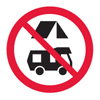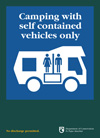What freedom camping is
Freedom camping is defined by the Freedom Camping Act 2011 as camping in a location that is not a designated campground and is:
- within 200m of an area accessible by motor vehicle
- within 200m of the mean low water spring line of any sea or harbour
- on or within 200m of formed road or a Great Walks Track.
This applies when using:
- a motor vehicle (including camper vans)
- a tent
- a bivouac
- another type of temporary structure.
Freedom Camping Act 2011: 5 Meaning of freedom camp – New Zealand Legislation
Freedom camping on public conservation land
As outlined in the Freedom Camping Act 2011, you can freedom camp on public conservation land except at sites where it is specifically prohibited or restricted.
Places where freedom camping is prohibited or restricted
- Scenic and recreation reserves: You cannot freedom camp in DOC-administered scenic or recreation reserves unless a designated campsite is provided or approved by DOC. Not all restricted areas will have "No Camping" signs. This is in accordance with the Reserves Act 1977.
- Prohibited areas: Freedom camping is not allowed in areas where DOC has explicitly prohibited it, even if you are in a certified self-contained vehicle. These restrictions may be due to conservation concerns or past camper behavior.
- Restricted areas: There are places where freedom camping is allowed but restrictions apply. For example, freedom camping is allowed for self-contained vehicles only, or stays are limited to a set number of nights. There may be a limited number of overnight spaces available with the remaining spaces available to day visitors. Signage onsite may be available to advise where freedom camping can or can’t occur.
Check a list of places where freedom camping is prohibited or restricted to self-contained vehicles only.
Conservation areas where freedom camping is prohibited or restricted
Rules when freedom camping
When freedom camping you must always:
- obey camping restriction signs.
- be responsible with your waste, including human waste.
- light no fires.
- do not damage flora and fauna
- be a responsible and considerate camper.
Failure to follow these rules may result in a fine.
Self-contained vehicles
From 7 June 2026, all vehicles must have a ‘green warrant’ to be certified self-contained under the new requirements. From this time, a warrant card must be displayed in your vehicle when camping in areas restricted to self-contained vehicles.
Vehicles with a portable toilet can no longer be certified as self-contained. The toilet must be fixed to the floor of the vehicle.
Find more about the self-contained vehicle certification requirements.
Freedom camping changes – Ministry of Business, Innovation and Employment
Camping restriction signs
No camping sign
Camping overnight is prohibited at sites displaying no camping signs, including this or a similar sign.
Self-contained vehicles only sign
This sign means that only certified self-contained vehicles may camp overnight.

Dogs
Freedom camping with dogs is not permitted in national parks.
For other public conservation land where freedom camping is permitted there may be different rules and bylaws for dogs.
Where you can take your dog and access rules
DOC campsites
DOC provides more than 320 campsites across the country.